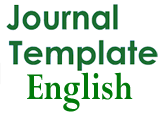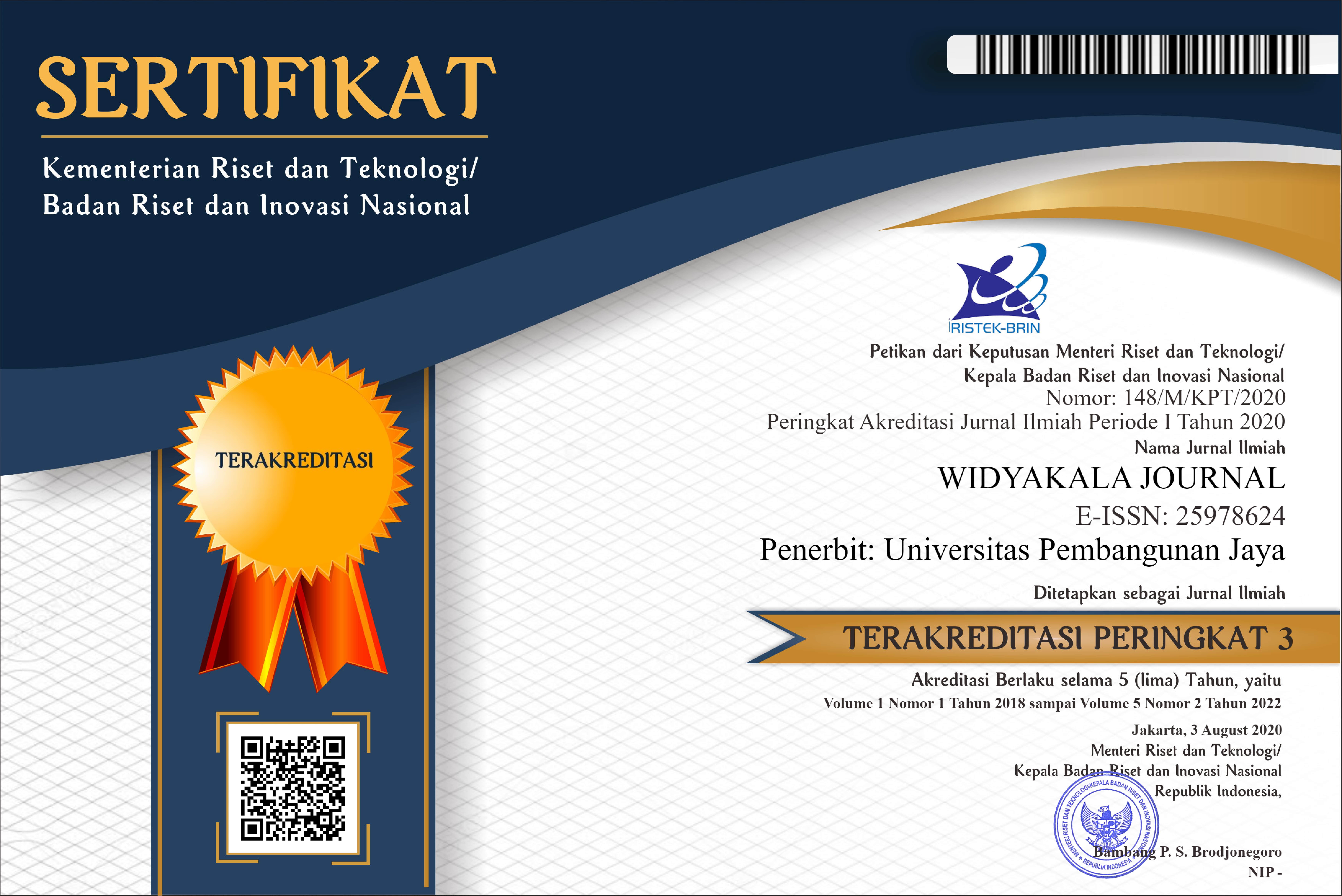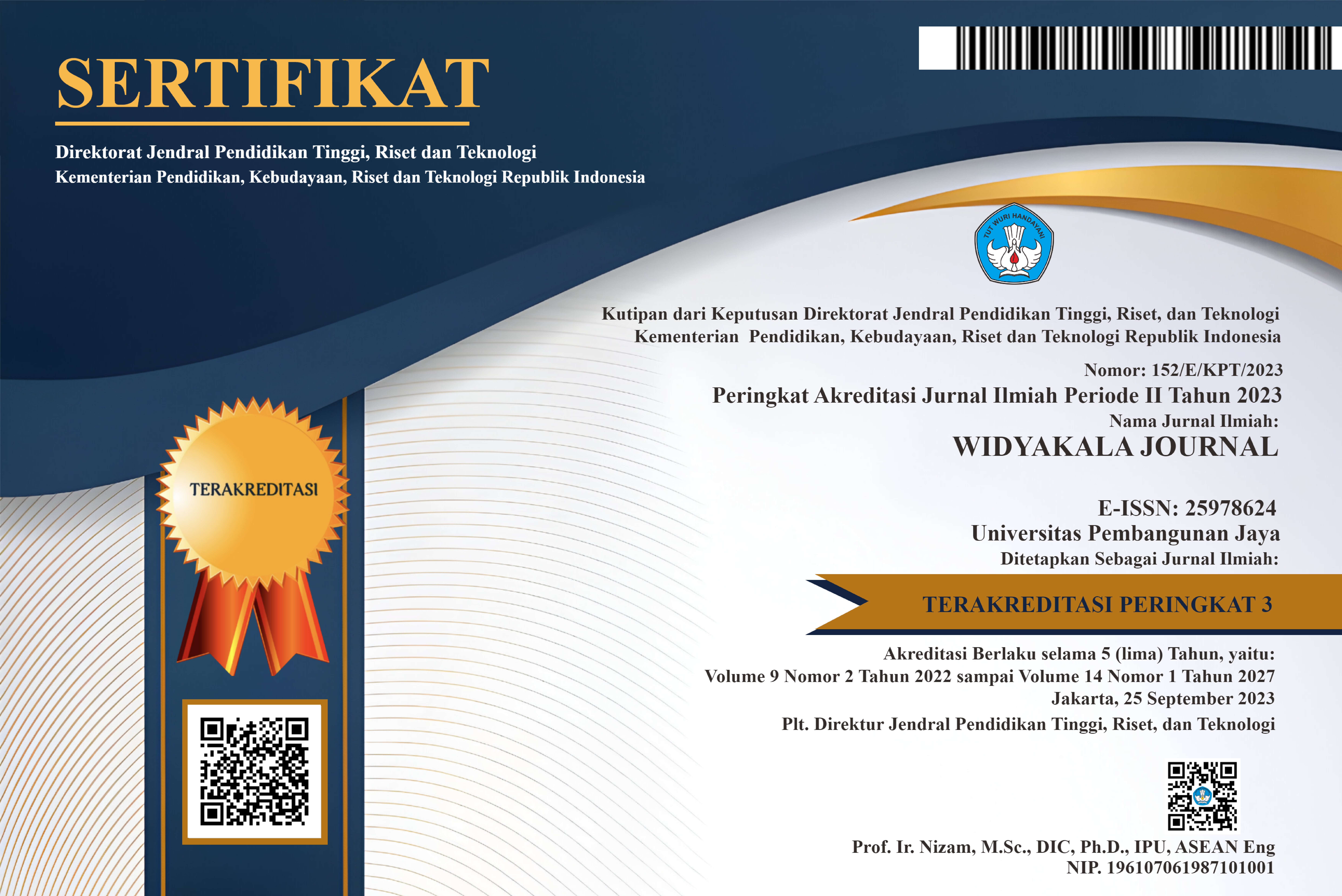Updated, March 2025
Managerial Ownership, Leverage, Profitability, Corporate Value: An Interactive Effect In Indonesia Stock Exchange
Abstract
Keywords
Full Text:
PDFReferences
Ajaz, Taufeeq, et al. (2017). Stock prices, exchange rate and interest rate: evidence beyond symmetry. Journal of Financial Economic Policy. https://doi.org/10.1108/JFEP-01-2016-0007
Al Faraoque Tony van Zijl, et al. (2005). A Simultaneous equations approach to analysing the relationship between owneship structure & performance in Bangladesh.
AnasAl & Laham. (2013). The effect of financial & systematic risk on stock returns in the Amman stock exchange. Finance & Accounting, 4(6).
Andre, O., & Salma, T. (2014). Pengaruh Profitabilitas , Likuiditas , dan Leverage Dalam Memprediksi Financial Distress (Studi Empiris Pada Perusahaan Aneka Industri yang Terdaftar di BEI Tahun 2006-2010). Jurnal WRA.
Andries et al. (2014). Analyzing time-frequency relationship between interest rate, stock price and exchange rate through continuous wavelet. Economic Modelling. https://doi.org/10.1016/j.econmod.2014.05.013
Anuchitworawong, C. (2004). Ownership-based Incentives, Internal Corporate Risk and Firm Performance. Retrieved from http://hdl.handle.net/10086/13931
Ararat, M., Black, B. S., & Yurtoglu, B. B. (2017). The effect of corporate governance on firm value and profitability: Time-series evidence from Turkey. Emerging Markets Review, 30, 113–132. https://doi.org/10.1016/j.ememar.2016.10.001
Arthur J Keown. (2012). Financial Management : Principles and Application. In Reyes & Lamberton (Eds.), Pearson Australia Group Pty Ltd (6th ed.). Australia: Pearson Education, Prentice Hall.
Awomuse et al. (2012). The Relationship between Nominal Interest Rates and Inflation: New Evidence and Implication for Nigeria. Asia Pacific Financial Studies, 3(9), 158–164.
Bartram, S. M., Brown, G. W., & Conrad, J. (2011). The effects of derivatives on firm risk and value. Journal of Financial and Quantitative Analysis, 46(4), 967–999. https://doi.org/10.1017/S0022109011000275
Brealey, R. A., Myers, S. C., & Allen, F. (2008). Brealey, Myers, and Allen on Real Options. Journal of Applied Corporate Finance. https://doi.org/10.1111/j.1745-6622.2008.00204.x
Brigham, E. F., & Houston, J. F. (2013). Dasar-Dasar Manajemen Keuangan. Salemba Empat. https://doi.org/10.1145/2505515.2507827
Chiou, C. C., & Su, R. K. (2007). On the relation of systematic risk and accounting variables. Managerial Finance. https://doi.org/10.1108/03074350710760278
Cho, C. H., Freedman, M., & Patten, D. M. (2012). Corporate disclosure of environmental capital expenditures: A test of alternative theories. Accounting, Auditing and Accountability Journal. https://doi.org/10.1108/09513571211209617
Claude, & Campbell. (1996). Political Risk, Economic Risk, and Financial Risk. Financial Analyst Journal, Vol. 52(6), 29–46.
Coles, J. L., Daniel, N. D., & Naveen, L. (2008). Boards: Does one size fit all? Journal of Financial Economics, 87, 329–356. https://doi.org/10.1016/j.jfineco.2006.08.008
Coles J.L, D. et al. (2004). Managerial Incentives and Risk Taking. In Finance & Accounting, George state university.
Dedi riyatno. (2007). Pengaruh suku bunga Sertifikat Bank Indonesia dan Nilai kurs terhadap risiko sistematis di BEI. Keuangan Dan Bisnis, 5(1), 24–40.
Dybvig, P. H., & Warachka, M. (2015). Tobin’ s q does not measure firm performance: Theory, empirics, and alternatives measures. Empirics, and Alternatives.
Ehrhardt, M. C., & Brigham, E. F. (2014). Corporate Finance: A Focused Approach. In The effects of brief mindfulness intervention on acute pain experience: An examination of individual difference. https://doi.org/10.1017/CBO9781107415324.004
García-Sánchez, I. M. (2010). The effectiveness of corporate governance: Board structure and business technical efficiency in Spain. Central European Journal of Operations Research, 18, 311–339. https://doi.org/10.1007/s10100-009-0112-4
Goh, C. F., Ali, M. B., & Rasli, A. (2014). The use of partial least squares path modeling in causal inference for archival financial accounting research. Jurnal Teknologi (Sciences and Engineering). https://doi.org/10.11113/jt.v68.2930
Graham, J. R., & Harvey, C. R. (2001). The theory and practice of corporate finance: Evidence from the field. Journal of Financial Economics. https://doi.org/10.1016/S0304-405X(01)00044-7
Gupta, P., & Kennedy, D. (2009). Corporate Governance and Firm Value : Evidence From Canadian Capital Market. Corporate Ownership and Control, 6(3), 293–307.
Hair et al. (2011). PLS-SEM: Indeed a silver bullet. Journal of Marketing Theory and Practice. https://doi.org/10.2753/MTP1069-6679190202
Hartono, Jogiyanto, & Sulistiawan, D. (2014). The market quality to technical analysis performance: Intercountry analysis. Gadjah Mada International Journal of Business. https://doi.org/10.22146/gamaijb.5658
Hellman Niclas. (2005). Can we expect institutional investors to improve corporate governance? Scandinavian Journal of Management, 21(3), 293–327. https://doi.org/https://doi.org/10.1016/j.scaman.2004.06.005
Hermeindito, C., & Tandelilin, E. (2013). Control Mechanism and Value of Firm: Empirical Evidence from Indonesia Capital Market. International Research Journal of Business Studies. https://doi.org/10.21632/irjbs.6.1.45-62
Houmes R, Mac, A., & Stranaha, H. (2018). The Operating Leverage Impact on Sytematic Risk within of Choice : an Anlaysis of the US Trucking Industry. Managerial Finance, 38(12), 1184–1202.
Jensen and Meckling. (1976). Theory of the Firm, managerial behavior, agency cost and ownership structure. Financial Economic, 3(4), 305–360.
Jiang, C., Chen, H., & Huang, Y. (2006). Capital expenditures and corporate earnings. Managerial Finance. https://doi.org/10.1108/03074350610703812
Jiao, Y. (2010). Stakeholder welfare and firm value. Journal of Banking and Finance, 34(10), 2549–2561. https://doi.org/10.1016/j.jbankfin.2010.04.013
Kasman., & et al. (2011). The impact of interest rate and exchange rate volatility on banks’ stock returns and volatility: Evidence from Turkey. Economic Modelling. https://doi.org/10.1016/j.econmod.2011.01.015
Kim, S. H., & Lee, K. H. (2014). Pricing of liquidity risks: Evidence from multiple liquidity measures. Journal of Empirical Finance. https://doi.org/10.1016/j.jempfin.2013.11.008
Lee, C. H., & Hooy, C. W. (2012). Determinants of systematic financial risk exposures of airlines in North America, Europe and Asia. Journal of Air Transport Management, 24, 31–35. https://doi.org/10.1016/j.jairtraman.2012.06.003
Lew, S. H. (2015). Investment Expenditures and Firm Value. The Korean Academic Association of Business Administration. https://doi.org/10.18032/kaaba.2016.29.1.021
Lin, X., Wang, C., & et al. (2018). Investment, Tobin’s q, and Interest Rates. Journal of Financial Economics, 130(3), 620–640. https://doi.org/10.1016/j.jfineco.2017.05.013
Ling, D. C., & Naranjo, A. (1997). Economic Risk Factors and Commercial Real Estate Returns. Journal of Real Estate Finance and Economics. https://doi.org/10.1023/A:1007754312084
Lustig, H., & Verdelhan, A. (2011). The cross section of foreign currency risk premia and consumption growth risk: Reply. American Economic Review. https://doi.org/10.1257/aer.101.7.3477
Majanga, B. B. (2018). Corporate CAPEX and market capitalization of firms on Malawi stock exchange: an empirical study. Journal of Financial Reporting and Accounting. https://doi.org/10.1108/JFRA-10-2016-0080
Mandelker, G. N., & Rhee, S. G. (1984). The Impact of the Degrees of Operating and Financial Leverage on Systematic Risk of Common Stock. The Journal of Financial and Quantitative Analysis. https://doi.org/10.2307/2331000
Markowitz, H. (1952). Portfolio Selection Harry Markowitz. The Journal of Finance.
Modigliani, F., & Miller, M. H. (1963). Corporate Income Taxes and the Cost of Capital: A Correction. American Economic Review. https://doi.org/10.2307/1809167
Myers, S. et al. (1984). Corporate financing & investment decisions when firms have information that investor. Financial Economic, 13, 187–221.
Norhafiza Nordin. (2014). The impact of commodity prices, interest rate and exchange rate on stock market performance: an empirical analysis from Malaysia. Malaysian Management Journal, 18, 39–52.
Nursakti Niko R, et al. (2017). The Effect of Capital Expenditure and Market Share on Profits per Region in an Indonesian Mobile Telecommunications Company. Advances in Economic, Business and Management Research, 55.
O’Sullivan, D., & McCallig, J. (2012). Customer satisfaction, earnings and firm value. European Journal of Marketing, 46(6), 827–843. https://doi.org/10.1108/03090561211214627
Pan W. (2018). How does the macroeconomy respond to stock market fluctuations? the rule of sentiment. Macroeconomic Dynamics, 1365–1005(18), 1–26. https://doi.org/10.1017/S1365100518000287
Pasternack D, & Rosenberg. (2011). The impact of Stock Option Incentives on Investment and Firm Value. Swedish School of Economics and Business Administration, 476.
Peters, R. H., & Taylor, L. A. (2017). Intangible capital and the investment-q relation. Journal of Financial Economics, 123(2), 251–272. https://doi.org/10.1016/j.jfineco.2016.03.011
Rachmawati, & Laila. (2015). Faktor makroekonomi yang mempengaruhi pergerakan harga saham pada indeks saham Syariah Indonesia (ISSI) di Bursa Efek Indonesia (BEI). Jurnal Ekonomi Syariah Teori Dan Terapan, 2(11).
Rani T, & Khan A. (2017). Financial Variables and Systematic Risk. Chinese Business Review, 16(1), 36–46. https://doi.org/10.17265/1537-1506/2017.01.004
Santosa, P.W., & Puspitasari, N. (2019). Corporate Fundamentals, Bi Rate And Systematic Risk: Evidence From Indonesia Stock Exchange. Jurnal Manajemen, 23(1), 40–53. https://doi.org/10.24912/jm.v23i1.443
Shen, N., & Kevin Au. (2018). Diversification Strategy, Ownership Structure and financial Crisis : Performance of Chinese Private Firms. Asia Pacific Financial Studies, 47, 54–80. https://doi.org/10.1111/ajts.12203
Shin, H.-H., & Stulz, R. M. (1998). Are Internal capital Markets Efficient? The Quarterly Journal of Economics. https://doi.org/10.1162/003355398555676
Sudiyatno, B., Puspitasari, E., & Kartika, A. (2012). The Company’s Policy, Firm Performance, and Firm Value: An Empirical Research on Indonesia Stock Exchange. American International Journal of Contemporary Research.
Sudjono. (2002). Analisis keseimbangan dan hubungan simultan antara variabel ekonomi makro terhadap indeks harga saham di bursa efek jakarta dengan metode VAR (Vector Autoregression) dan ECM (Error Correction Model). Riset Ekonomi Dan Manajemen, 2(3), 81–97.
Syahib, N. (2000). Analisis Pengaruh Beberapa Faktor Fundamental dan Risiko Sistematik Terhadap Harga Saham (Industri Barang Konsumsi yang Go Public di Pasar Modal Indonesia). Jurnal Ekonomi Dan Bisnis Indonesia.
Tandelilin, E. et al. (2007). Corporate governance, risk management, and bank performance: Does type of ownership matter? Eadn Working Paper.
Utami, W. R., Hartoyo, S., Nur, T., & Maulana, A. (2015). The Effect of Internal and External Factors on Stock Return : Empirical Evidence from the Indonesian Construction Subsector. Asian Journal of Business and Management.
Utari, N., & Sari, M. (2016). Pengaruh asimetri informasi, leverage, kepemilikan manajerial dan kepemilikan institusional pada manajemen laba. E-Jurnal Akuntansi.
Vafeas, N., & Vlittis, A. (2019). Board executive committees, board decisions, and firm value. Journal of Corporate Finance, 58, 43–63. https://doi.org/10.1016/j.jcorpfin.2019.04.010
Villalonga B, A. R. (2004). How do family ownership, management and controlaffect firm value? MA 02163(HArvard Business School. The Warton school Univerity of Pennsylvania, PA 19104).
Watts, R. L. (1977). Corporate financial statements, a product of the market and political processes. Australian Journal of Management. https://doi.org/10.1177/031289627700200104
Yu, E. P. yi, Guo, C. Q., & Luu, B. Van. (2018). Environmental, social and governance transparency and firm value. Business Strategy and the Environment, 27(7). https://doi.org/10.1002/bse.2047
DOI: https://doi.org/10.36262/widyakala.v8i2.443
Refbacks
- There are currently no refbacks.
Copyright (c) 2021 WIDYAKALA: JOURNAL OF PEMBANGUNAN JAYA UNIVERSITY

This work is licensed under a Creative Commons Attribution-ShareAlike 4.0 International License.
Redaksi Jurnal Widyakala
Lembaga Penelitian dan Pengabdian Kepada Masyarakat (LP2M)
Universitas Pembangunan Jaya
Jalan Cendrawasih Raya Blok B7/P, Sawah Baru, Ciputat, 15413
Telp : 021-7455555 ext 1311
widyakala.journal@upj.ac.id


















